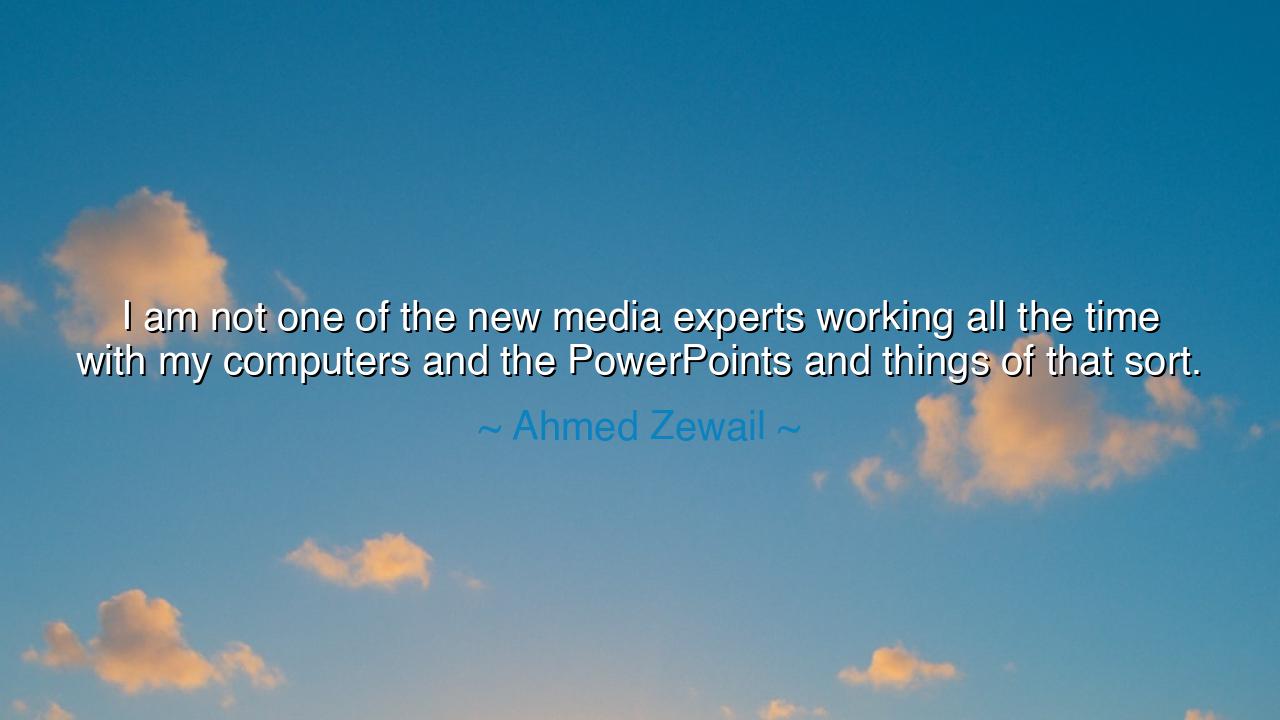
I am not one of the new media experts working all the time with
I am not one of the new media experts working all the time with my computers and the PowerPoints and things of that sort.






When Ahmed Zewail said, “I am not one of the new media experts working all the time with my computers and the PowerPoints and things of that sort,” he was not rejecting technology but reminding the world of something far deeper—the eternal primacy of thought, curiosity, and human spirit. Zewail, a Nobel laureate in Chemistry and the father of femtochemistry, lived at the frontier of science, yet he understood that true discovery begins not in machines but in the mind that questions. His words are a call to return to the roots of creation—to remember that all tools, no matter how advanced, are only extensions of the human soul.
In an age intoxicated by screens and presentations, Zewail’s humility strikes like a bell of wisdom. He declares himself not a “new media expert,” not because he despised progress, but because he refused to let it define him. For him, computers and PowerPoints were instruments—useful, but never sacred. The scientist, the thinker, the creator—these roles require something that no machine can replicate: imagination, intuition, and the courage to sit in silence with a question. Zewail reminds us that it is not the brightness of the screen but the brightness of the mind that changes the world.
This truth can be seen across the corridors of history. Isaac Newton, who discovered the laws of motion and gravity, worked not with computers but with candlelight and parchment. Marie Curie distilled her discoveries through perseverance, not presentation slides. The ancients built pyramids, invented mathematics, and charted the stars—all without the convenience of “new media.” Yet their achievements endure because they were rooted in vision, not vanity. Zewail’s statement is, in essence, a defense of depth over display, of mastery over modernity.
The modern world often confuses tools for talent. A thousand presentations may dazzle, yet say nothing. A computer may store a million facts, yet know no truth. Zewail’s own work—the capturing of chemical reactions at the femtosecond scale—was born not from flashy technology, but from focused thought and relentless curiosity. The technology served him, but it did not define him. He wielded it as a blacksmith wields his hammer: with purpose, not pride. This is the mark of wisdom—to command the tool, not be enslaved by it.
There is something profoundly humanistic in his message. Zewail reminds us that knowledge is not a spectacle; it is a discipline of the soul. He did not seek to impress with slides, but to illuminate minds. His classrooms were not theaters but sanctuaries of inquiry. In his manner and method, he carried the spirit of the ancients—the philosophers of Alexandria, the mathematicians of Greece, the scholars of the Abbasid Golden Age—those who believed that understanding was a sacred duty, not a performance.
In a broader sense, his words are also a warning. As humanity builds machines capable of thinking, we risk forgetting how to think ourselves. When form eclipses substance, when technology becomes a crutch rather than a tool, wisdom withers. Zewail’s humility shields against this decay. He reminds us that the heart of discovery lies in stillness, in concentration, in the direct encounter between mind and mystery. To work endlessly with devices is to risk losing the inner laboratory where the greatest experiments of thought occur.
Thus, Ahmed Zewail’s declaration is not a retreat from the modern age but a call to master it. He stands as a guardian of balance—a scientist of the future who carried the wisdom of the ancients. His life teaches that progress without reflection is hollow, and that true innovation flows from the union of reason, wonder, and humility. The tools may change, but the mind—the luminous core of creation—remains eternal.
Final Lesson: Never mistake the instrument for the idea, nor the presentation for the truth.
Practical Actions: Use technology as your servant, not your master. Spend time in deep thought without screens. Seek understanding over appearance, and mastery over speed. Let your work, like Zewail’s, be guided not by the noise of the new, but by the timeless rhythm of inquiry and imagination. For it is not the computer that creates—it is the mind that dares to wonder.






AAdministratorAdministrator
Welcome, honored guests. Please leave a comment, we will respond soon